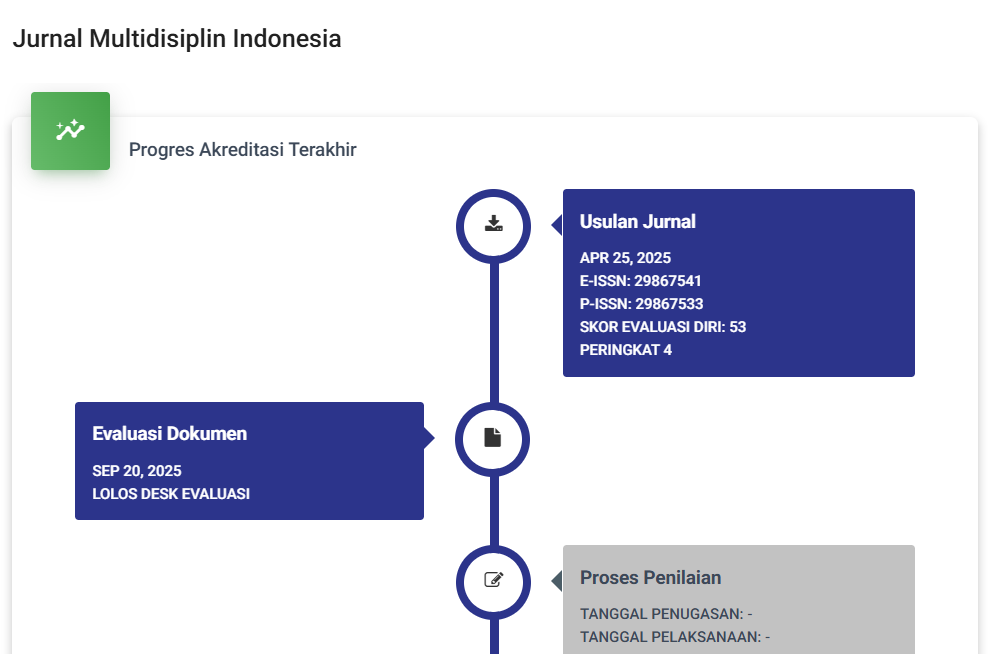Fiscal Deficit And Inflation: A Macroeconomic Correlation Study In Indonesia
DOI:
https://doi.org/10.62007/joumi.v3i2.531Keywords:
Fiscal Deficit, Inflation, Monetary Policy, Macroeconomic Stability, Policy Synchronization, Indonesian EconomyAbstract
This research examines the relationship between fiscal deficit and inflation in Indonesia during the 2000-2023 period. Using secondary data from Bank Indonesia and the Ministry of Finance, this study applies correlation and regression analysis methods to test the linkage between these variables. The results show a moderate positive correlation (r=0.61) between fiscal deficit and inflation in Indonesia, with significant but non-linear influences across different periods. Further analysis reveals that this relationship is moderated by factors such as economic growth, Bank Indonesia's monetary policy, and external conditions. These findings imply the importance of synchronizing fiscal and monetary policies to maintain Indonesia's macroeconomic stability, as well as considering structural aspects such as production capacity and government spending efficiency in fiscal deficit management.
References
Barro, R. J. (1989). The Ricardian approach to budget deficits. Journal of Economic Perspectives, 3(2), 37-54.
Basuki, A. T., & Prawoto, N. (2016). Analisis hubungan defisit anggaran dan inflasi di Indonesia. Jurnal Ekonomi & Studi Pembangunan, 17(1), 23-37.
Blanchard, O. (2017). Macroeconomics (7th ed.). Pearson.
Fischer, S., Sahay, R., & Végh, C. A. (2019). Modern hyper- and high inflations. Journal of Economic Literature, 40(3), 837-880.
Friedman, M. (1970). The counter-revolution in monetary theory. Institute of Economic Affairs.
Hossain, A. A., & Chowdhury, A. (2020). Monetary policy, inflation, and economic growth in selected ASEAN economies. Routledge.
Indarti, D., Indarto, B. A., & Jayanti, F. D. (2023). Pengaruh Kinerja Keuangan terhadap Penghindaran Pajak di Perusahaan Tambang yang Terdaftar di BEI (Studi Kasus Perusahaan Tambang pada Tahun 2016-2020). Jibaku: Jurnal Ilmiah Bisnis, Manajemen dan Akuntansi, 3(2), 1-12.
Indarto, B. A., Ani, D. A., & Tantra, A. R. (2024). Pengaruh Leverage, Komisaris Independen, Dan Intensitas Modal Terhadap Tax Avoidance Perusahaan Konstruksi Terdaftar BEI 2020 –2022. Jurnal Akuntansi dan Pajak, 24(2).
Indarto, B. A., Ani, D. A., Tantra, A. R., & Jayanti, F. D. (2024). Pengembangan Model Pengukuran dan Pelaporan Carbon Footprint di Bidang Green Accounting dalam Transisi Menuju Ekonomi Rendah Karbon. Jurnal Ekonomi, Manajemen, Akuntansi, Bisnis Digital, Ekonomi Kreatif, Entrepreneur (JEBDEKER), 5(1), 119-130.
Kementerian Keuangan. (2021). Nota Keuangan dan APBN 2021. Kementerian Keuangan Republik Indonesia.
Keynes, J. M. (1936). The general theory of employment, interest and money. Macmillan.
Krugman, P., & Wells, R. (2018). Macroeconomics (5th ed.). Worth Publishers.
Mankiw, N. G. (2019). Macroeconomics (10th ed.). Worth Publishers.
Nasution, A. (2017). Koordinasi kebijakan fiskal dan moneter di Indonesia. Bank Indonesia Institute Working Paper, No. WP/1/2017.
Nguyen, H. M., & Boateng, A. (2018). The impact of excess reserves beyond precautionary levels on Bank Lending Channels in China. Journal of International Financial Markets, Institutions and Money, 56, 169-181.
Rahardja, P., & Manurung, M. (2019). Teori ekonomi makro: Suatu pengantar (6th ed.). Lembaga Penerbit Fakultas Ekonomi Universitas Indonesia.
Supartoyo, Y. H., Tatuh, J., & Sendouw, R. H. E. (2018). Pengaruh defisit anggaran terhadap inflasi dan pertumbuhan ekonomi di Indonesia. Jurnal Ekonomi dan Pembangunan Indonesia, 19(1), 1-20.
Tanzi, V. (2016). Fiscal deficits and inflation: A new look at the emerging market evidence. IMF Staff Papers, 48(1), 1-13.
Warjiyo, P., & Juhro, S. M. (2019). Central bank policy: Theory and practice. Emerald Publishing Limited.
Widodo, T., Azwar, S., & Pramono, S. H. (2022). Deficit fiscal and inflation during COVID-19 pandemic in Indonesia: A VECM approach. International Journal of Business and Economics Research, 11(2), 47-58.
World Bank. (2023). Indonesia economic prospects: Sustaining the recovery amid global headwinds. World Bank.
Yeyati, E. L., & Sturzenegger, F. (2021). The effects of monetary and exchange rate policies on development. Handbook of Development Economics, 5, 4283-4362
Yudanto, N., & Santoso, M. S. (2020). Dampak kebijakan fiskal dan moneter terhadap stabilitas makroekonomi Indonesia. Jurnal Ekonomi Pembangunan, 18(2), 219-234.
Downloads
Published
How to Cite
Issue
Section
License
Copyright (c) 2025 Rita Sugiarti, Heru Subiyantoro

This work is licensed under a Creative Commons Attribution-ShareAlike 4.0 International License.







